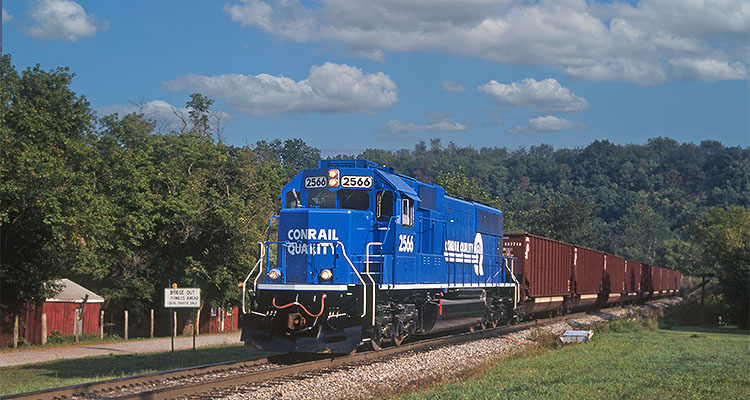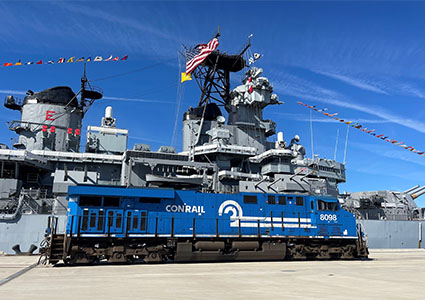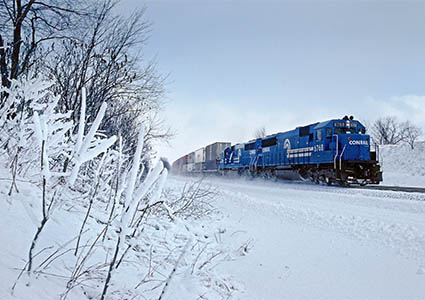
Discover the secrets behind Conrail’s growth in the Northeast’s waste and intermodal transport segment
As a terminal and switching service provider for its owners, CSX Transportation (CSX) and Norfolk Southern, Conrail consistently delivers safe and efficient rail services to many local rail freight customers in Detroit, New Jersey, and Philadelphia. Clients located along the company’s routes in these shared asset areas enjoy access to the national rail network through either Norfolk Southern or CSX. Although Conrail no longer oversees commercial affairs for customers, it remains vital in serving shippers and receivers as an agent for its owners. In its role as a local rail service provider, the company ensures that its customers’ freight shipments are safely and efficiently transported between their rail sidings and the long-distance freight trains operated by CSX and Norfolk Southern. President and Chief Operating Officer Brian Gorton offers a comprehensive introduction to Conrail’s business model and organizational structure.
 “We are a terminal switching company jointly owned by Norfolk Southern and CSX, though it has not always been the case. In the early 1970s, many of the Northeast railroads were going bankrupt. Consequently, in April 1976, Consolidated Rail Corporation, Conrail’s predecessor, was formed from a government initiative to save bankrupt railroads and consolidate them into a single railroad. From 1976 to 1998, before the merger between CSX and Norfolk Southern, it was classified as a Class 1 railroad. Following this merger, regulatory bodies like the Surface Transportation Board intervened to protect the interests of customers and shippers. They expressed concerns that having a single railroad in the Northeast, one of the largest metropolitan and consumer markets in the US, could lead to a monopoly.
“We are a terminal switching company jointly owned by Norfolk Southern and CSX, though it has not always been the case. In the early 1970s, many of the Northeast railroads were going bankrupt. Consequently, in April 1976, Consolidated Rail Corporation, Conrail’s predecessor, was formed from a government initiative to save bankrupt railroads and consolidate them into a single railroad. From 1976 to 1998, before the merger between CSX and Norfolk Southern, it was classified as a Class 1 railroad. Following this merger, regulatory bodies like the Surface Transportation Board intervened to protect the interests of customers and shippers. They expressed concerns that having a single railroad in the Northeast, one of the largest metropolitan and consumer markets in the US, could lead to a monopoly.
“The Surface Transportation Board aimed to prevent the potential for unfair trade advantages with customers being trapped with the single railroad’s particular rates. In response, the Conrail Shared Asset Organization (the commonly used name for modern-day Conrail) was created in around 1998 and continues to operate today in North Jersey, South Jersey, Philadelphia, and the Detroit metropolitan area. Despite not being officially classified as a railroad, we are recognized as a terminal switching company. At Conrail, we take pride in being the seventh largest railroad in the US and possessing all the Class 1 characteristics typical of other Class 1 railroads, albeit classified as a terminal switching company or a Class 3 railroad,” he explains.
According to Brian, its joint ownership structure grants Conrail unique advantages in the country’s northeastern rail landscape. “The number one benefit is that we have significant resources from our owners, Norfolk Southern and CSX, the latter of which is part of the Chessie System. Therefore, we are able to tap into these resources to ensure the continued prosperity of Conrail. Despite being staunch competitors, Norfolk Southern and CSX are exceptional business partners, and without their collaboration, Conrail would not have achieved the success it enjoys today. I directly report to eight board members, with four of them from CSX and the other four representing Norfolk Southern. Their outstanding support empowers us to deliver services effectively in the markets that we serve,” he says.
Servant leadership approach
With a solid ownership structure and reputation under its belt, Conrail is experiencing tremendous growth in waste and intermodal transport. Brian sheds light on the factors driving this growth. “In the Northeast, our landfills are expected to be capped out within the next five years. Currently, most of the landfills are serviced by truck-based waste management systems, though waste companies in the Northeast and across the US are seeking alternative methods to move this waste. Given that the Northeast is the largest consumer market and waste producer in the US, the close-to-capacity landfills require shippers to find new waste disposal options. As trucking waste to landfills is no longer a viable option, the industry is now turning towards rail operations to transport waste to newly established landfills in Ohio and Alabama. As a result, our company is expecting a tremendous amount of growth in waste transportation in the coming years.
“Moreover, we are poised to grow further in the intermodal sector. The New York market is a key hub with one of the largest ocean freight ports in the US, which attracts a substantial influx of containers from various global markets like South America, Asia, Europe, and Africa. The presence of major offices in New York also contributes to this growth. Furthermore, the proliferation of distribution centers, not only in New York and New Jersey but also in locations like Bethlehem, Pennsylvania, has encouraged a strategic focus on servicing these expanding markets,” Brian enlightens. 
While operations and expansion are on the upswing at Conrail, the challenge of employee retention persists in the transportation industry, especially as the world continues to recover from the devastating impact of the pandemic. “Lately, employee retention has become increasingly challenging as we come out of the throes of the pandemic, where people were incentivized to stay home. Unfortunately, this has led to difficulties in retaining employees not just within our transportation network, but throughout the entire economy as everyone readjusts to returning to work. Adding on to this challenge is the nature of our business, which operates 24 hours a day, every day of the year, in all sorts of environments and weather conditions. Moreover, many of our team members work on an extra board, where they are compensated but do not have a regular schedule. These employees fill in for absences due to sickness, vacations, and other reasons. Being on an extra board job without a regular schedule has proven a hindrance to retention. To address this issue, we are working on making the extra board system more appealing to our employees by offering additional sick days to enhance their quality of life and striving to provide a more structured schedule. As a result, our employees will gain a clearer understanding of their work schedules and a better work-life balance,” Brian adds.
In line with its dedication to employee retention, Conrail adopts a servant leadership approach that places its workforce at the heart of its priorities. “The railroad industry itself is a tough environment, particularly for our field personnel who work in diverse and sometimes harsh conditions at all hours of the day and night. Embracing a servant leadership approach, I firmly believe that as leaders, our primary role is to serve our employees. Our goal is to provide them with a safe workplace and equip them with the necessary resources and tools to excel in their jobs. In a unionized environment, the concept of servant leadership may not always be well-received, as employees may question our motives behind such actions or what the underlying agenda is. To convey that our intention is solely to enhance their quality of life and well-being, we offer additional days off for those on the extra board, predictive scheduling, focus on hiring the right individuals for the job, and foster a work environment that is conducive to well-being. Creating a positive work environment is a top priority for us. When employees raise concerns, it is essential to not just listen empathetically but to take concrete action in response. By actively addressing concerns, we aim to ensure that employees feel heard, supported, and encouraged to give feedback,” he ends.
By focusing on empowering its people, Conrail is poised for further growth in the evolving transportation landscape.